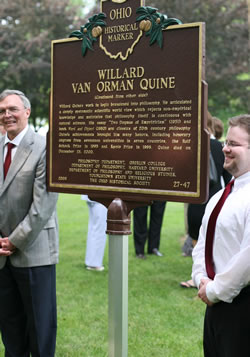The Philosophical Math Man
 The groundbreaking work of world-renowned philosopher and mathematician Willard Van Orman Quine continues to resonate today as his work is often cited by scholars and laypeople alike who credit Quine with turning the complex into the conversational without compromising the integrity of his work.
The groundbreaking work of world-renowned philosopher and mathematician Willard Van Orman Quine continues to resonate today as his work is often cited by scholars and laypeople alike who credit Quine with turning the complex into the conversational without compromising the integrity of his work.
The 1930 Oberlin College summa cum laude graduate, who died December 25, 2000, at age 92, conducted work in mathematical logic, set theory, philosophy of language, and ontology. His analysis of language and its relation to reality made him one of the most influential philosophers of the 20th century. His specialty was in mathematical logic and in the meaning of language, and he theorized that what exists is what our best theory says exists.
As a mathematical logician who wrote and published prolifically, many considered Quine a philosopher who focused his analytic talents on many apparently dissimilar doctrines and theses. Yet those who understood him best insisted on his status as a thinker, one who addressed and attempted to answer the larger questions of philosophy.
Like most philosophers, Quine set out to define the reality of the world and how humans fit into that reality. He concluded that a person could only understand the world empirically or through direct experience of it. He believed that nothing that humans know lies outside the realm of language, and so the theory of knowledge depended upon a theory of language.
Over the last half century his literary output was remarkable. Of his 22 books, his best known works include The Ways of Paradox, Mathematical Logic, Set Theory and Its Logic, Quiddities, a collection of essays, and his most influential, Word and Object. He also published his autobiography, The Time of My Life: An Autobiography. Critics called his writing style lucid and elegant.
Born in Akron, Ohio, to a father who owned a heavy equipment company and a mother who worked as an elementary school teacher, Quine liked math in high school and became a math major at Oberlin College. He also had a strong interest in philosophy. His honors thesis at Oberlin was published in the Journal of the London Mathematical Society and it landed him at Harvard University, where he began to study philosophy to study with Alfred North Whitehead.
Quine earned his doctorate from Harvard just two years later, one of the fastest in the school's history. He started teaching philosophy at Harvard in 1936 and never left, except for a four-year stint in the Navy. He spoke at least six languages and often read philosophical works written in the language of the author. He retired from Harvard in 1978 as the Edgar Pierce Professor of Philosophy.
He married and had three daughters and a son.
Oberlin awarded him an honorary doctor of letters degree in 1955, and he held a dozen and a half other honorary degrees. He received the 1993 Rolf Schock Prize in Stockholm, and the 1996 Kyoto Prize in Tokyo.
In recognition of Quine’s vast contributions to several fields, a number of colleges and universities are hosting centennial events in 2008 to mark the 100th anniversary of his birth. On June 25, 2008, 100 years to the date of his birth, Oberlin erected a plaque on the southeast grounds of the King Building. The College’s development office, the Oberlin Heritage Center, and the Ohio Historical Society cosponsored the event as a part of Oberlin’s 175th anniversary celebration.
Other institutions honoring Quine this year include the University of Oslo (Norway), National University of San Marco (Lima, Peru), Princeton University, Stanford University, and Harvard.
Photography by John Seyfried
Sources: New York Times, obituary, December 29, 2000, issue; the Los Angeles Times, December 31, 2000, issue; Oberlin Alumni Magazine, spring 2001.